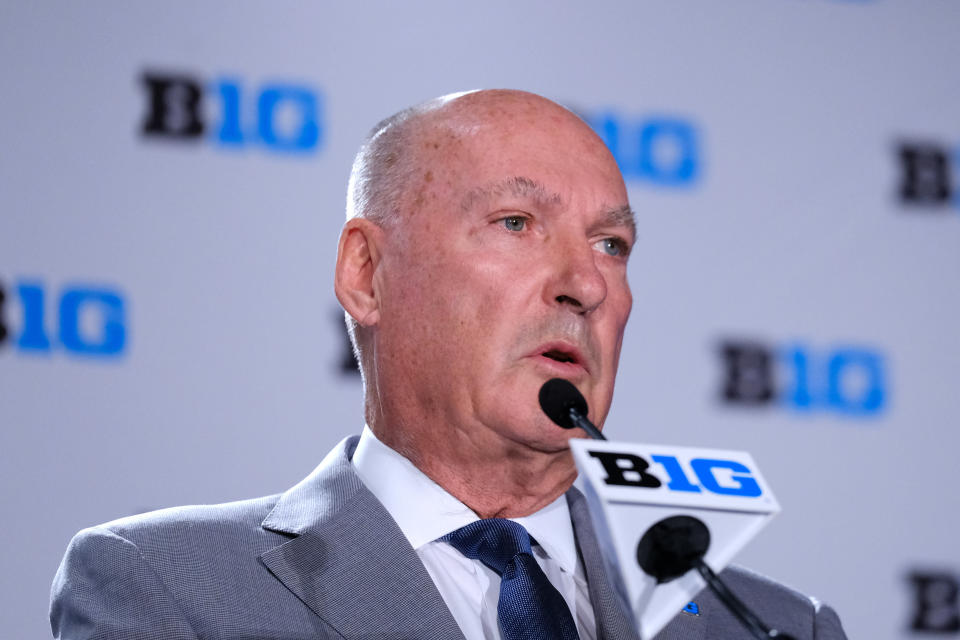Big Ten commissioner Jim Delany stepping down, leaving complicated legacy

One of the most outsized figures in college athletics will be stepping down after next year. The Big Ten conference announced on Monday morning that commissioner Jim Delany will be concluding his tenure with the league when his contract expires in June 2020.
While the news isn’t a particular surprise, it marks the end of one of the most influential and polarizing tenures in college sports, as Delany took over the league in 1989. Delany, 71, shepherded the league into an era of enormous financial windfall with his role in the advent of the Big Ten Network. Big Ten schools annually make more than $50 million, the biggest number in college athletics.
But Delany’s legacy includes the controversial decision to turn the Big Ten into a 14-team super conference, causing collateral damage around the athletics world and receiving diminishing returns on the field with schools like Rutgers and Maryland. He was also a stout playoff opponent for nearly a decade, caving only when public pressure increased and opportunity dwindled. He touted the Big Ten’s devotion to the Rose Bowl, even when it became apparent it hindered progress and common sense in the sport.
In a phone interview on Monday morning, Delany reflected on his decision, legacy and some of the divisive issues that defined his tenure.
“Three decades-plus is more than enough time to have the impact,” he said. “It’s been a time of change and challenge and will continue to be that. My view is that we’re not settling down for a while. We’re in a good place.”
Delany said he’d be “very lightly involved” with choosing his successor, as the conference has hired a search firm and he’d prefer the presidents to pick his successor. It opens one of the most prestigious and lucrative jobs in college athletics, as Delany has a reported salary of more than $3 million and reported future bonus payouts of $20 million.
With the Big Ten’s current television contract expiring in 2023, whoever succeeds Delany would be tasked with handling a contract expected to reset the financial precedent in the sport.
The invention of the Big Ten Network, which launched in 2007, may be the accomplishment under Delany that resonates the most. It not only changed the league’s financial paradigm, but also reverberated throughout the sport. “It disrupted the television environment from a college standpoint,” Delany said, noting that ESPN was the only cable bidder in the market at the time. “There had been regional television networks, but it allowed for the emergence of other conference networks. And it also encouraged Fox to get in the game more deeply.”
In other words, it helped enable the boom in coaching salaries and facilities, and the overall explosion in the sport we’ve seen in the past 15 years.
Part of that cable boom included conference expansion, which hovered over the sport in the past decade. During Delany’s tenure, the league added Penn State (1990), Nebraska (2011) and both Rutgers and Maryland in 2014. While Penn State and Nebraska have been well received and generally successful, both Maryland and Rutgers have been troubled on the field, especially in football, and rife with off-field issues. Delany defended the additions. “I feel good about them both,” he said, adding that Rutgers and Maryland haven’t even competed in the conference for a half-decade. “In the long run, it’ll be great for them and great for us.”
For nearly a decade, Delany stood out on the landscape as a staunch anti-playoff advocate. He and his fellow commissioners finally capitulated after two SEC schools, Alabama and LSU, played in the Bowl Championship Series title game after the 2011 season.
Delany said his stance was rooted in protecting the Rose Bowl, which was “the conference’s most important external relationship for 70 years.”
“We stayed there for 17 years,” he said of the BCS. “I think in the end, the public turned negative toward the BCS. You don’t have to be Sherlock Holmes to read the signals.”
Delany’s departure will kick off a new round of speculation about playoff expansion, as even the notion he was open to talking about it after last season kicked off a round of frenzied – and ultimately too aggressive – speculation. Delany did note it has been frustrating for the league to have teams finish fifth, fifth and sixth in the past three years. (The Big Ten has been shut out from the playoff the past two seasons.) “We try and avoid whining on an annual basis,” he said.
He said the playoff would “probably” expand “in the long term,” but isn’t sure about the short term. “There are five or six very important interests in college football, and only two or three are being served,” he said. “That’ll be for another generation to address. In the short term, we are where we are.”
When asked about accomplishments, Delany mentioned Northwestern’s charmed run to the Rose Bowl in 1995 and his league’s consistent ability to put teams in basketball’s Final Four. He also noted the league’s compliance record, generally, while building these accomplishments.
Delany said he’ll likely do some speaking, teaching and perhaps consulting when he’s done. But those are things to talk about for another day. He said he leaves feeling grateful and fulfilled. “I feel like,” he said, “I’ve had my shot.”
More from Yahoo Sports:

